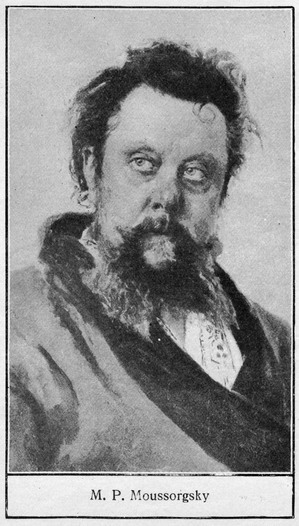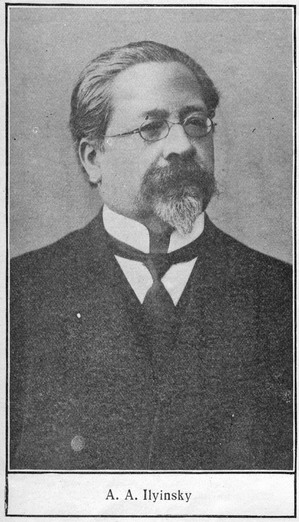 ALEXANDER ALEXANDROVICH ILYINSKY.
ALEXANDER ALEXANDROVICH ILYINSKY.
(Il-yins’-ke.)
Ilyinsky was born at Tsarkoe Selo, January 24, 1859. His musical education was received in Berlin, where he first studied pianoforte under Theodore Kullak at the Conservatory and afterwards studied theory with Bargiel at the Königliche Akademie. He returned to Russia in 1885 and became a professor at the Music School of the Philharmonic Society at Moscow. He has composed many works in the larger forms, including three suites for orchestra, a symphony, a Symphonic Scherzo, Croatian Dances, music to the Oedipus Rex and Philoctetes of Socrates, an overture to Tolstoy’s Czar Feodor, a symphonic sketch, Psyche, two cantatas, and an opera entitled, The Fountain of Bakchiserai. He is best known, however, by his charming songs and pianoforte pieces. The pianoforte music includes the delightful Berceuse, three popular mazourkas, La Princesse Enchantée Reverie and a Romance. Owing to the influence of his German training, and perhaps a little to the influence of Tchaikovsky, Ilyinsky is less characteristically Russian than many of his contemporaries. Nevertheless, his music has much of the charm and piquancy not untouched with sadness peculiar to the music of the Slavic races.
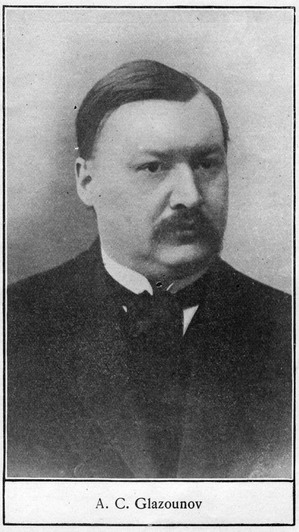 ALEXANDER CONSTANTINOVICH GLAZOUNOV.
ALEXANDER CONSTANTINOVICH GLAZOUNOV.
(Glaz’-oo-nov.)
Glazounov was born August 10, 1865, at St. Petersburg, Russia, and was the son of a well-known bookseller and publisher. After leaving school he attended lectures at the University of St Petersburg. He commenced to study music at the age of nine under Elenovsky, and subsequently on the advice of Balakirev studied with Rimsky-Korsakov. He showed astonishing talent as a composer, and speedily came to the front. He received encouragement also from Anton Rubinstein, and as Rubinstein and Rimsky-Korsakov were at the head of opposing schools of thought, Glazounov enjoyed exceptional advantages. Liszt was also much interested and obtained a hearing for his works in Weimar. Success in Paris and in London followed. His works include seven symphonies, symphonic poems, orchestral suites, and much other orchestral and chamber music. While Glazounov cannot be said to have altogether fulfilled the promise of his youth, he undoubtedly occupies a prominent place among contemporary Russian composers. He has never had the hard light for recognition that is the lot of most composers, and has never known the pinch of poverty. Since 1899 he has been professor of instrumentation at the St. Petersburg conservatory.
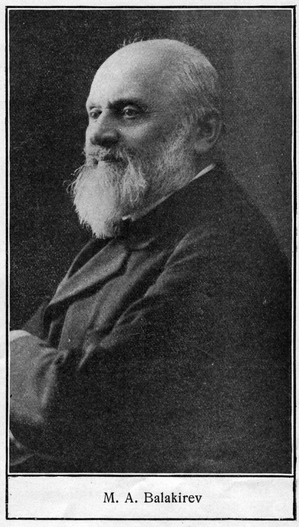 MILI ALEXEIVICH BALAKIREV.
MILI ALEXEIVICH BALAKIREV.
(Bah-lah-kee’-reff.)
Balakirev was born at Nijny Novgorod, Russia, January 2 (December 31, O. S.), 1836. He received much help and instruction from Oulibishev, and at the age of eighteen went to St. Petersburg. Glinka named Balakirev as his successor in the work of building up a national Russian school of music when Balakirev was only twenty years old. Around Balakirev there gathered a group of ardent enthusiasts, many of whom were older than himself. Among these were Cui, Moussorgsky, Rimsky-Korsakov and Borodin. In 1862 Balakirev, with the assistance of Stassov, founded the Free School of Music of St. Petersburg, and in 1869 he became director of the Imperial Chapel and conductor of the Imperial Russian Musical Society. Balakirev was a man of remarkable erudition, and while he had a thorough grasp of the classic forms, he seems to have guessed intuitively the advances which were being made by Wagner, Schumann and Berlioz, though their works had scarcely yet reached Russia. His own compositions are comparatively few, but they are full of lyric sentiment, passion, and show profound command over technical resources. For many years Balakirev has been living in obscurity, having taken refuge in the mysticism which absorbed the later years of Tolstoy, Gogol and Dostoievsky.
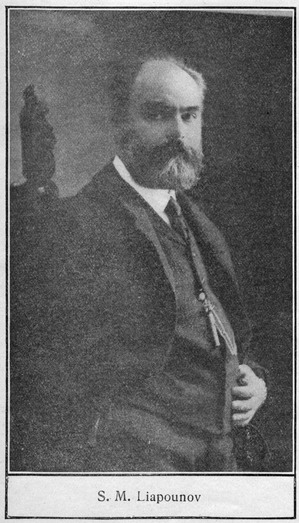 SERGIUS MIKHAILOVICH LIAPOUNOV.
SERGIUS MIKHAILOVICH LIAPOUNOV.
(L’ya’-poonov.)
Liapounov was born at Yaroslav, Russia, November 30, 1859. He gained his early musical education by going to the classes of the Imperial Musical Society at Nijny Novgorod. Subsequently he went to the Moscow Conservatory, but left there in 1883, having studied under Klindworth and Hubert. He was specially appointed by the Geographical Society to collect folk-songs in the governments of Vologda, Viatka and Kostroma (1893). A similar task was also undertaken by Liadov and Balakirev and it is significant, regarding the astonishing development of Russian music during the past half century, to realize how much the Russian composers are indebted to the folk-songs of their country. Liapounov’s experiences doing this work well fitted him to edit the collection of national songs, as he afterwards did. From 1894 to 1902 he was assistant director of the Imperial Chapel. His compositions include a symphony, a ballade for orchestra, concerto for piano, and many smaller pianoforte works. His pianoforte works, however, are of considerable difficulty, involving intricate rhythms and complicated fingering. Among them may be mentioned the 12 Etudes d’execution transcendante a Barcarolle, Scherzo, Novelette, Mazurkas, and the Valse Pensive.
Moussorgsky was born at Karevo, Russia, March 28, 1835, and died at St. Petersburg, March 28, 1881. He entered the Russian army, but on meeting with Dargomijsky and the leaders of the “New Russian School” his musical inclinations got the better of him. Against the advice of Cui, Rimsky-Korsakov, Balakirev, Borodin and Stassov, he resigned his military appointment and endeavored to win success at music. He was morbid, sensitive, at times over-confident and at times utterly despondent in disposition. Sheer poverty forced him to accept a government position in the interior, but he soon wore out the patience of his department and was obliged to return to Petersburg. He remained there from 1870 to 1871, working constantly. His opera Boris Godounov had already attracted attention and had earned for him restricted recognition as a composer of great originality, but only a few realized his great genius. Rimsky-Korsakov, a warm and faithful friend, shared rooms with him until his marriage left Moussorgsky dependent on his own resources. He gradually sank from bad to worse, morally, physically, and mentally, until he faded out of a world into which he never quite fitted. He left several operas, orchestral and choral music, piano music and songs, reflecting his own anarchic ideals, and wild Slavic temperament.
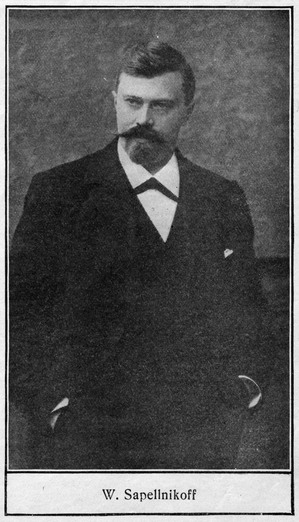 WASSILI SAPELLNIKOFF.
WASSILI SAPELLNIKOFF.
(Sah-pel’-ne-kof.)
Sapellnikoff was born at Odessa, Russia, November 2, 1868. He showed considerable musical talent as a child, and on the advice of Anton Rubinstein was sent to the Conservatory of Music at Moscow. Here he became a pupil of Sophie Menter, Kessler and Brassin. He became a professor of the pianoforte at the Conservatory in 1897, having made his début as a concert pianist at Hamburg in 1888. He resigned this position after a few years in order to take up his residence in Germany, living for a time at Leipzig, and afterwards at Munich. He has won a considerable amount of popularity in England as well as in Germany. Up to the present Sapellnikoff has not visited this country, but he is well known to American music lovers by his many compositions for the piano. Some of the best known of these are Danse des Elfes, Gavotte, Petite Mazurka, Second Gavotte, Lily of the Valley, Berceuse and Polka Caprice. These works are for the most part very melodious and within the range of the ability of a fairly good pianist. As a pianist Sapellnikoff has won great favor. His earlier playing was characterized by a lack of restraint which won him popularity with the many rather than with the few who discriminate. In later years, however, he has adopted a more musical style with great advantage to his reputation.


